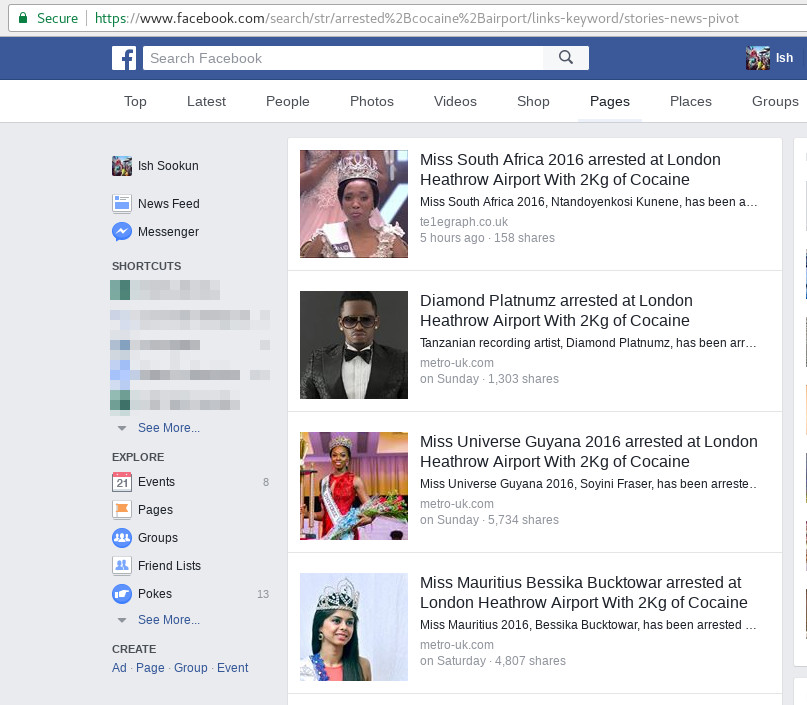Can a like or share on Facebook amount to Cybercrime?
February 21, 2017
internet facebook law-justice cybercrimeRecently a “fake news” item flooded the Facebook feeds in Mauritius. The website which would dupe people in thinking it is Metro UK, published an article that said Miss Mauritius was arrested in the UK. Utterly false!
The following is a statement by the Cybercrime Unit of the Mauritius Police Force:
Du côté de la Cyber-crime Unit, une source officielle affirme que si Bessika Bucktawor fait une déposition formelle à la police, des actions seront prises non seulement contre ceux à l’origine de l’article, mais également contre les personnes qui ont partagé le lien. D’ajouter que les internautes reconnus coupables sont passibles d’une amende ne dépassant pas Rs 1 million ou d’une peine d’emprisonnement maximale de cinq ans.
Source: lexpress.mu
Will you land in jail because of a Facebook share?
The question that many are asking is whether a like or share on Facebook would amount to cybercrime? The answer could somehow depend on the interpretation of Section 46(h)(ii) of the ICT Act 2001 of Mauritius which says:
Any person who uses an information and communication service, including telecommunication service for the purpose of causing annoyance, inconvenience or needless anxiety to any person shall commit an offence.
I call that the wildcard law of the Cybercrime Unit because they’d use it for anything instead of doing proper investigation and gather evidence against the root cause of “annoyance”. They would most of the time bully people around with this section of the legislation rather than doing proper education on social behavior and responsibilities on the internet. I won’t be surprised if they shamelessly apply a wildcard law again easy preys (i.e people who blindly share any article on Facebook) rather than hitting it hard against the webpage owner using their authority and legal means.
Dear Cybercrime Unit. Would you please act like a responsible authority? Gather evidence, build your case & get a takedown notice!
What about the responsibility of internet users?
I’ve seen people arguing on Facebook that it is not easy to verify authenticity of an article or “it looked like authentic”.
Article authenticity does not come with a label. It requires more or less common sense and a little effort. Like in the case of this “arrested with cocaine” thing, a search on Facebook with the words “arrested cocaine airport” returns the following:

The top four results include the webpage that went viral in Mauritius. One should notice that the results have similar titles with only the name/country and photo having changed. Does it not ring the bell? If one would scroll down further there are several, at least a dozen, such webpages referring to popular figures in various countries.
Authenticity verification is sometimes just “three words” and one click away. However, that effort appears as if too much to ask.
The misfortune of being questioned over and over because of “fake news” and some times even media not verifying the sources struck Pakistani singer and songwriter Hadiqa Kiani.
Going LIVE on @ARYNEWSOFFICIAL to address this FAKE news. Cannot believe that I have to address such nonsense at this point in my career
— Hadiqa Kiani (@Hadiqa_Kiani) February 14, 2017
#Law is law after all?
In 2015 the Supreme Court of India struck down a similar controversial law which allowed police to arrest people due to “inconveniences” caused to other people.
Justice RF Nariman said the following on Section 66A of the IT Act of India:
It could send a person to jail for three years for sending an email or other electronic message that “causes annoyance or inconvenience”.
Source: BBC.com
The law was first challenged by an Indian student following the arrests of two young women who posted comments after the death of an influential politician.
We have witnessed arrests due to Facebook posts in Mauritius too. Is there anyone challenging this controversial law?